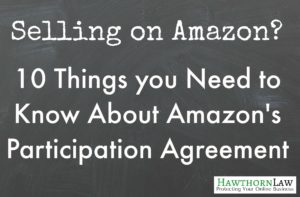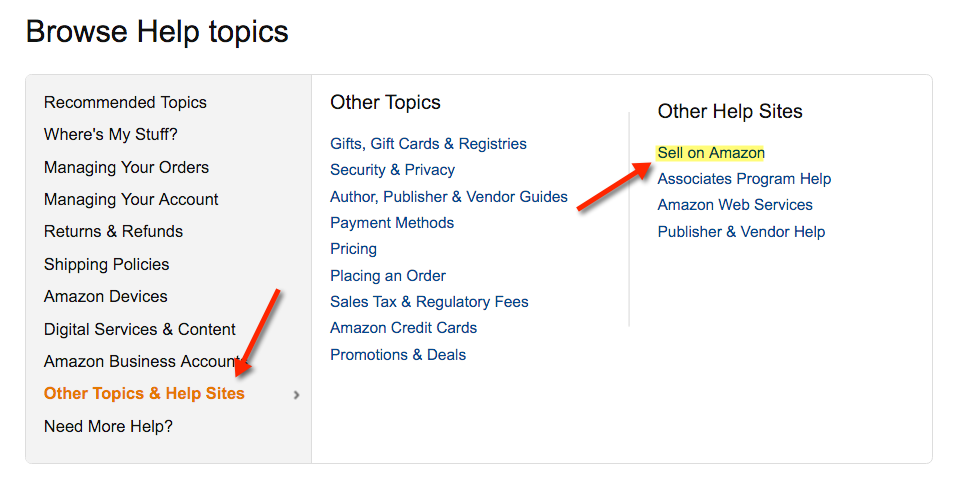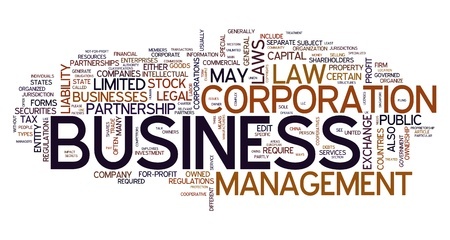
Quick note, however – the Amazon Participation Agreement for sellers changes frequently. I'll do my best to update this post if and when the information changes, but keep in mind that this information is up to date as of March 31, 2016.
LEGAL DISCLAIMER: Amazon's Terms of Service and Participation Agreement are governed by the laws of the State of Washington. No attorney at Hawthorn Law is licensed to practice law in Washington State, and none of the information provided herein should be construed as legal advice. This is general information regarding common contract provisions and their meaning. If you have a specific issue that requires individualized legal advice, we recommend you contact a lawyer directly.
10 Things You Need to Know about Selling On Amazon
Before I even start with this list, you need to be aware that when you decide to sell products on Amazon, you are agreeing to abide by Amazon's “Participation Agreement” for sellers. This agreement is somewhat difficult to find. If you want to click through to find it, start at the “help” page. Click on “Other Topics and Help Sites”, then click on “Sell on Amazon”. See below:
There are a ton of options on the “Sell on Amazon” page. You want to choose “Policies and Agreements” as seen below.
One other caveat here. Even after you get to this page, you will notice that Amazon has in place various policies and agreements for a number of different scenarios. The “Selling Policies” is the link you need to be aware of. Under that link, you will find a link to “prohibited seller activities and actions“.
If you haven't already taken some time to read through this page, I recommend you check it frequently. If you violate any of the provisions of this page you can get your account shut down, and nobody wants that, do they?
A Word about the “Community Rules”
There are 5 bedrock “community rules” that Amazon has highlighted, front and center, on it's main Policy and Agreements page.
Here they are, together with my personal interpretation of what they mean:
- Honor your commitment to buy or sell. In other words, don't put a listing on Amazon for a fake product that you don't intend to sell. If you allow someone to purchase a product from you, then you should be prepared to deliver that product. This is especially true for FBM (seller-fulfilled) accounts. If you are FBA and you run out of inventory, Amazon will take down your listing automatically.
- Maintain current account information. I'm not sure this requires any explanation
- If your selling privileges have already been removed, you may not establish a new selling account. In other words, don't get your account shut down or you may not be able to establish a new one.
- Leave thoughtful feedback about your transaction partners. Amazon thrives on it's review and feedback systems. Although this is not required, Amazon encourages everyone who uses it's platform to leave thoughtful and honest feedback.
- Do not misrepresent yourself. In other words, don't pretend to be someone you are not.
If you violate any of these rules, your seller account could be shut down. All of these rules are incorporated into the Participation Agreement that you bind yourself to by becoming an Amazon Seller.
Now, here are the 10 things you need to know about selling on Amazon, from a legal standpoint.
One thing is clear, Amazon has a lot of good lawyers working for them. They have drafted participation agreements, prohibited activity policies, more participation agreements… they've pretty much covered their butts on any potential legal issue that could arise from anyone selling stuff on Amazon.
So whether you are a merchant/seller on Amazon, or a buyer, Amazon can rely on these agreements to get itself out of pretty much any possible legal issue.
So if you run into a problem or become frustrated that Amazon did something you don't like, chances are that their participation agreement will govern that issue. And let's be honest, their agreements are written in their favor, not yours.
1. “We may refuse service to anyone for any reason.”
This nugget is taken from paragraph 5.j. of the Participation Agreement. Although this opening statement is fairly self-explanatory and common among larger corporations, there are lots of other gems in this paragraph that you should review and be aware of. For instance, did you know:
- Amazon can seek reimbursement from you if a buyer requests a refund under the Amazon “A to Z” guarantee.
- They can take this money from you via future proceeds from your sales, by charging your credit card, or by taking the money directly from your bank account.
And if you think that you can just shut down your seller account, demand your money, and build your own platform, think again… Amazon will hold your account open for “charge-backs, refunds, adjustments or other amounts paid to Buyers” for 90 days after you cancel your account. Only after 90 days will they send you the money in your account (paragraph 5.k.).
2. Amazon is not a bank (paragraph 5.l.)
Amazon appears to be solvent and their business model is strong. But in the event things were to go south for Amazon, be aware that whatever money they are holding for you is not safe. If Amazon were to declare bankruptcy, the funds in your seller account “represent an unsecured claim against Amazon Payments.” Furthermore, these funds “are not insured by the Federal Deposit Insurance Corporation.”
Amazon doesn't hold your funds in a separate account. They are combined with the proceeds of other sellers. In addition, Amazon is permitted to invest those funds (am I'm sure they do), although you are not permitted to receive any interest or other earnings on those funds. But here's my favorite part of this paragraph:
“[Amazon] will not voluntarily make such funds available to its creditors in the event of bankruptcy or for any other purpose, and will not knowingly permit its creditors to attach such funds.”
But I imagine that they could “involuntarily” make these funds available to creditors, and they could “unknowingly” permit its creditors to attach these funds…
In other words, if Amazon ever were to go bankrupt, you are pretty much SOL.
3. Amazon retains complete control over your listing (paragraph 6)
How many times have you become frustrated when Amazon either won't let you make a change to your listing, or they change something automatically on their own? You try to change it back and either you can't, or you can – but the next day Amazon has changed it back to the way they like it one more time.
Maybe you are locked out of your listing and can't change it at all? Maybe Amazon has changed your images or your bullet points?
How can they do that? Paragraph 6 of the Participation Agreement is how…
“Amazon retains the right to determine the content, appearance, design, functionality and all other aspects of the Site and the Services (including the right to re-design, modify, remove and alter the content, appearance, design, functionality, and other aspects of the Site and the Service and any element, aspect, portion or feature thereof, from time to time), and to delay or suspend listing of, or to refuse to list, or to de-list, or to require Seller not to list, any or all products in our sole discretion.”
So next time Amazon changes your listing around – don't bitch about it on Social Media. Remember that this is what you agreed to when you signed up to sell on Amazon.
4. Amazon is not responsible for collecting taxes on your transactions. (Paragraph 10)
Many people mistakenly believe that because Amazon doesn't voluntarily collect sales tax for you, that you are not legally required to collect it.
This is not true. In fact, paragraph 10 of the Participation Agreement spells out that “it is the seller's responsibility to determine whether Seller Taxes apply to the transactions and to collect, report, and remit the correct Seller Taxes to the appropriate tax authority…”
Notwithstanding, Amazon does offer tax calculation services and will apply taxes to your sales if you ask them to do so. But after that, you are responsible for reporting and remitting those taxes where required by law.
5. You may not register your account under a false name (paragraph 13.a.)
I'm sure I'm not relaying any information here that you didn't already know, but by registering under a false name, or using an invalid or unauthorized credit card on your account amounts to fraud, and violates numerous state and federal laws. If you do this, Amazon will cooperate with law enforcement “to ensure that violators are prosecuted to the fullest extent of the law.”
6. You can't sue Amazon to help you go after a rogue seller or customer that is ripping you off. (paragraph 16)
Hijackers are a big problem for Amazon sellers. Dealing with them, or getting them off a seller account, is one of the issues that I am asked about almost daily. It's borderline ridiculous how often I get asked about this.
But here's the bottom line – Amazon considers itself to be a marketplace where buyers and sellers come together to do business. Amazon is not (and does not consider itself to be) a judge or jury that has any interest in getting involved in your dispute with another seller or a buyer, or anyone else for that matter. They spell this out pretty clearly in paragraph 16 of the participation agreement:
“IF A DISPUTE ARISES BETWEEN ONE OR MORE PARTICIPANTS, EACH OF YOU RELEASE AMAZON AND AMAZON PAYMENTS (AND THEIR RESPECTIVE AGENTS AND EMPLOYEES) FROM CLAIMS, DEMANDS, AND DAMAGES (ACTUAL AND CONSEQUENTIAL) OF EVERY KIND AND NATURE…”
And this dovetails nicely into the next provision you should be aware of…
7. Amazon is not liable to you or anyone else for damages (Section 17, paragraphs a and b)
Section 17 of the participation agreement is extremely important for you to understand. It carries with it two separate paragraphs, one that contains and indemnification clause, and the other that limit's Amazon's liability.
Paragraph a. With this indemnification provision, Amazon is essentially saying that if Amazon gets sued because of you, then you will step in Amazon's place and defend them. Fun, right?
Here are some of the disputes that are covered under this paragraph:
- [A]ny and all claims, costs, losses, damages, judgments, penalties, interest and expenses (including reasonable attorneys' fees)…
- Actual or alleged breach of your representations, warranties, or obligations…
- Disputes related to your own website or other sales channels, the products you sell, any content you provide, the advertisement, offer, sale or return of any products you sell…
- Any actual or alleged infringement of any intellectual property or proprietary rights by any products you sell or content you provide, or
- Seller Taxes or the collection, payment or failure to collect or pay Seller Taxes.
In defining a “Claim”, Amazon means pretty much anything – (“any claim, action, audit, investigation, inquiry or other proceeding”).
Paragraph b. This is pretty much exactly what it says. Amazon is limiting its liability for pretty much anything.
“NEITHER AMAZON NOR AMAZON PAYMENTS WILL BE LIABLE FOR ANY DAMAGES OF ANY KIND, INCLUDING… THE PARTICIPATION AGREEMENT, THE SITE, THE SERVICES, THE TRANSACTION PROCESSING SERVICE, THE INABILITY TO USE THE SERVICES OR THE TRANSACTION PROCESSING SERVICE, OR THOSE RESULTING FROM ANY GOODS OR SERVICES PURCHASED OR OBTAINED OR MESSAGES RECEIVED OR TRANSACTIONS ENTERED INTO THROUGH THE SERVICES.”
Pay special attention to this – there is a reason the lawyers put it in ALL CAPS. And it is not because they want to look like they are YELLING AT YOU.
8. You can't sue Amazon
Yes, you heard me correctly. You can't sue Amazon and if you try, you will get thrown out of court. That's because of the forum selection provision in paragraph 18 of the Participation Agreement. Not only is Amazon limiting potential court cases to small claims matters in King County, Washington, but it also provides a forum selection clause to deal with intellectual property infringement in the Federal Courts of King County, Washington.
If you attempt to sue Amazon, your case will be dismissed and you will be referred to binding arbitration as outlined in paragraph 18. See below:
“The laws of the state of Washington govern this Participation Agreement and all of its terms and conditions, without giving effect to any principles of conflicts of laws or the Convention on Contracts for the International Sale of Goods. Each party consents that any dispute or claim relating in any way to this Participation Agreement or your use of the Services or Transaction Processing Services will be resolved by binding arbitration as described in this paragraph, rather than in court…”
9. Amazon isn't going to decide disputes between you and other sellers or buyers (paragraph 19)
Paragraph 19 states that Amazon is not an agent of the buyer or seller for any particular purpose. Amazon doesn't want to get involved in your disputes. Specifically, paragraph 19 says that “Amazon urges Sellers and Buyers to cooperate with each other to resolve such disputes.”
10. Amazon owns your listing and anything you put on it (paragraph 20)
I've already mentioned that Amazon owns your listing. But did you also know that by uploading images and by writing sales copy on your listing, you grant to Amazon a “royalty-free, non-exclusive, worldwide, perpetual, irrevocable right and license to use, reproduce, perform, display, distribute, adapt, modify, re-format, create derivative works of, and otherwise commercially or non-commercially exploit in any manner, any and all of” this content?
Not only that, but Amazon can also sublicense the rights to your intellectual property.
I bet you didn't know that, did you?
However, there is a caveat… Amazon will not alter your trademarks. And if you ask them to take them down (if you can't do it yourself), then they will honor that request. See below:
“[W]e will not alter any of your trademarks … from the form provided by you … and will comply with your removal requests as to specific uses of your trademarks (provided you are unable to do so using standard functionality made available to you via the Site or Services).“
So this is one more reason to get your name and logo trademarked ASAP.
Final Thoughts about Selling on Amazon…
So with all this legal mumbo jumbo, does it even make sense to sell on Amazon? If you are reading this, you are probably giving some serious thought to starting an “Amazon business”, or maybe you already have. Don't let this information dissuade you from following your dreams and building a products business on Amazon.
Just know that Amazon is a large corporation, and as such, they can control the terms of your engagement with them. They have the traffic, and because of that, they have control. Use Amazon's terms to your benefit, grow your businss and brand, and then take your business to your own real estate (i.e. your own website).
Amazon is a great starting place – you just need to know what you are getting into before you start.
If you have any questions, or are just getting started, make sure to check out my legal checklist for new businesses. Whether you are starting on Amazon or somewhere else, it's a great resource to help you get started and get your legal ducks in a row.






Very good to know, I was wondering how Amazon could make it impossible for people to sue them – why doesn’t every company do that?
They have a rock-solid terms of service agreement for anyone that uses their platform.
Where can I see copy of Amazon seller’s agreement that seller accept before start selling? My audit team asks for it.
In amazon selling help, there are multiple links (for each topic) but not a complete agreement.